C. Tangana, Spanish rapper: ‘I’ve realized that I’m not 100% hip hop culture’
Two-and-a-half years after the release of the album that made him a global star, the artist is preparing to kill the past. He has a new documentary out, directed by his own LA-based production house, Little Spain. It narrates the vitality and creative process behind his music. EL PAÍS spoke with the singer about what’s been going on in his life and what’s coming next
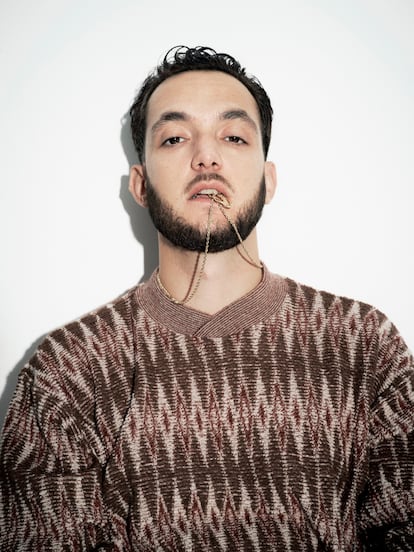
There are wanted children, there are unexpected children and there are unwanted children. When Spanish rapper C. Tangana released his second studio album, El Madrileño, on February 26, 2021, the collection was certainly unwanted by the industry… and even by his fans. After having burst onto the music scene five years earlier with a more urban vibe, in this album — after recruiting a diverse array of Spanish and Latin artists, such Jorge Drexler, Andrés Calamaro, Kiko Veneno, Niño de Elche and Eliades Ochoa — he delivered a product in which rumba and rap met cabaret and folk music.
El Madrileño wasn’t just the name of a project. It represented an almost tragic character — a resident of Madrid — like David Bowie’s Ziggy Stardust, a bisexual extraterrestrial who brought the spirit of Broadway musicals to glam rock. For C. Tangana — a Madrid native himself — there was only room for excessive success or epic failure when he embraced a change of rhythm.
Born in 1990, he grew up learning to love long after-dinner conversations. To the hip hop world, he brought the music that several generations of Spaniards — including his elderly friends and relatives — had heard at home. For too long, many had ignored their roots.
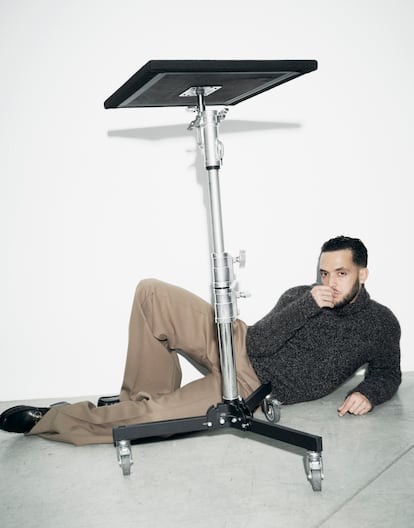
His song Tú Me Dejaste de Querer — “you stopped loving me” — surpassed one-and-a-half million listens on Spotify in just 24 hours. A year after the album was released, C. Tangana had sold 160,000 copies and picked up three Latin Grammys, making El Madrileño the best-selling album in Spain of 2021. And, in April of 2022, his tour broke the audience record at the Palau Sant Jordi arena in Barcelona, when 18,360 people showed up to hear him.
Another song of his called Demasiadas Mujeres — “too many women” — has accumulated over 350 million listens on Spotify. Rarely in the history of music in Spain has an artist who is so artistically brilliant and relevant been so commercially and culturally successful.
This past September 28, a documentary aired in Spain. This Excessive Ambition narrated the gestation, birth and conversion of El Madrileño into a transoceanic phenomenon. It premiered before 3,000 spectators in San Sebastián, Spain. Directed by Cris Trenas, Santos Bacana and Rogelio González — members of the singer’s LA-based production company, Little Spain — it will hit theaters in the Spanish-speaking world on October 26.
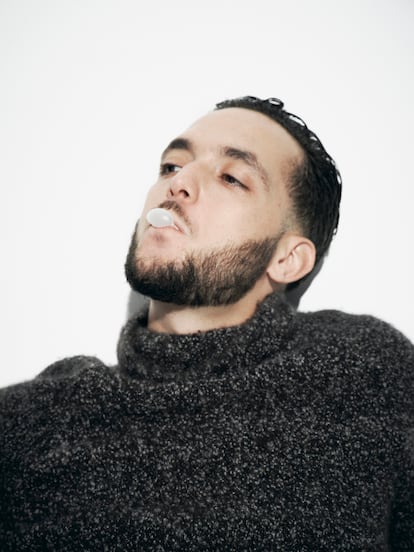
Sitting in a tiny photography studio in Carabanchel — a district of Madrid –—C. Tangana (or Antón Álvarez, his given name) seems tired. He’s just come from lunch at his uncle’s house. Tonight, he’ll be meeting two lifelong friends — those who’ve seen him working in fast food restaurants when he was growing up. They also knew him as Crema (“cream”) when he rapped as a teenager, before he morphed into Ídolo (“idol”) — a kind of seductive male stripper, wrapped in euro bills and thongs.
Back then, he had a Catalan girlfriend named Rosalía, who wasn’t so bad at singing either. “Look, if you change friends when things are going well for you, you should change them again when things are going badly for you. But I prefer to stay with my boys,” Tangana shrugs.
Before the premiere of the documentary — which delves into his life and work — he’s somewhat restless. He feels that he exposed too much of himself in the film, especially as someone who has never felt the need to narrate what he had for breakfast on Instagram. “I don’t like people seeing how I lose my temper or how I speak. I watch it and I want to hit pause and explain: ‘Look, here’s what had happened, or this or that.’ I [come across as vulnerable], vomiting, crying. It’s my fucking life. You see my insecurities. And, well, I have to accept myself. I haven’t worked out for a year, I’m fatter, sometimes I’m an asshole, like everyone else... I don’t know, let it be seen.”
“I’ve aged a lot, I’m worn out. There are relationships that have been pushed to the limit, words that have been said and cannot be erased…” he trails off, both regretful and proud of not having made “the typical documentary about the artist who’s such a good person and gives a lot of money to charitable causes.”
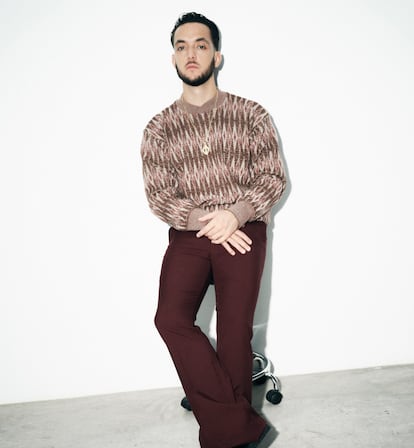
The narrative begins in Cuba, when El Madrileño was still a plan B, since C. Tangana had already recorded an album that was more of a continuation of his previous work. The record label was convinced that it was best to follow the same vein. But then, Santos Bacana was enlisted as creative director of the project… and a door suddenly opened, looking out into an abyss.
In the documentary, you see the little moments and the big ones. From going out to eat sausage, to buying $30,000 curtains for a concert. There are tragedies, arguments, a sprained ankle playing soccer in the Canary Islands, a storm, a collaborator wondering why the door on their dressing room doesn’t read “artist.” C. Tangana — wearing a jacket reminiscent of Tony Soprano, eating spaghetti bolognese at the Chateau Marmont in Los Angeles — is recorded talking about money and needing to go to his therapy session.
At times, it feels more like Apocalypse Now than a documentary about a successful singer who once posed on a yacht surrounded by 10 girls. But if in that image he shouted that he had everything and the post-Me Too world responded loudly, he now seems to have closed the door on modernity, having instead opened a door to classicism. El Madrileño may have been a global success, but it was also a tragic figure, symbolizing the end of an era.
Question. Your musical transition seems like a good strategy…
Answer. Dammit, it seems like it’s all part of a strategy, but it’s not. I’m an artist who makes music. I’m not that smart. Some of the topics I [understand] are business, money, marketing. A while ago, I did a shoot for a magazine where they show nudes… Interviú, that’s the name. It seemed like I was going to do a nude. That’s not just so that people can see more of you: it’s an action that speaks to how I expose myself as an artist. It can be seen as something [exploitative]. [You need to make sure that you] dominate the business and not let the business dominate you. This is an industry that’s ripped us off a lot.
Q. It’s difficult to discern whether El Madrileño was progressive or reactionary.
A. I don’t know, I don’t think I had the ambition to be a disruptor. Without wanting to be, you can achieve something original. When you try too hard to be disruptive, it shows: let’s do something weird! You’re better off telling me something that excites me. Show me things from a different perspective, because if it’s just strange, it doesn’t matter to me. It’s also true that I’ve always felt very comfortable with whatever’s fresh… I see new things and I’m not sure I fully understand them.
Q. What has the success of the El Madrileño album given you and what has it taken away from you?
A. It’s helped me earn my place. The other [albums were] more youthful, but [you can now see] that I’m not a typical rapper. I’m a guy who writes songs and faces the world like an athlete. My parents didn’t listen to soul and gospel music. Now I’m in a much more natural place. The forms of expression come out on their own. That also changes the way I expose myself.
Q. Do you miss rap?
A. A lot. Rap is a model of male personality. It was difficult to be that man when I was a child… and when I [became that man], I was told it was wrong. But [the genre] gave me stability. The truth is that I wanted to convince myself that I was 100% hip hop culture and no, honestly, I’m not.
Q. Have you managed to do something with this project that you won’t regret in 10 years?
A. It’s something that obsesses me, the idea of transcendence. I think I went through that phase, the one of youthful restlessness, of wanting to do something important, of status. And that search eventually led me to remove everything. [I have a totally different perspective now]. I still want to seek transcendence, but now I see that it’s something that has more to do with community, with respect. This is a whole new world for me.
Q. Was this project transcendent, or was it a failure?
A. It was predestined. In Cuba, I saw that it was going to be legendary. It can’t be that you have Eliades Ochoa (a Cuban guitarist) singing songs by El Pescaílla (an iconic Spanish composer) and something legendary doesn’t come out.
I’m always careful to bring myself down from my high so that I don’t have many expectations — this keeps me safe. I don’t enjoy the process as much, but I don’t get disappointed, either. But despite that nature of mine that tends to downplay everything, I saw the potential there.
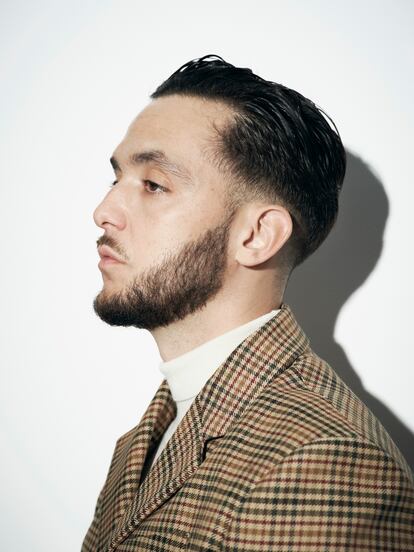
A bucket full of lobsters, some strippers and C. Tangana’s suite in Las Vegas. With these ingredients, Rogelio González and Santos Bacana met. The rapper left the room to attend the Latin Grammys gala, while the two filmmakers stayed behind, eating seafood and chatting with the strippers. A friendship was born. Along with Cris Trenas, they formed the soul of the Little Spain production house in Los Angeles, in the years before the pandemic. They put together an esthetic ideology that revolves around 1970s Spain, pop culture and humor.
“Santos is my favorite artist in the world,” C. Tangana confesses. They’re the directors of This Excessive Ambition. But, in reality, they’re much more than that. “The numbers for Pucho’s tour (Pucho being C. Tangana’s childhood nickname) were being calculated. Things weren’t going well. His team had the idea of making a documentary to recover some money… we accepted because we understood that it was a long process and — as there were three of us — we could maintain the company and other projects,” Bacana explains. “We were trying to save Pucho’s [finances]... but in the end, [the documentary] almost put an end to Little Spain,” González chimes in.
“Following Pucho is interesting, because he’s not a typical artist, he gets involved in everything. He has a very particular way of working. Plus, we’re very close friends. It’s been a relationship that has gone beyond work. There’s a freedom that allowed us to get involved when we saw that we needed more to the story. [We were able to] rejoice in the misfortunes that were good for the documentary’s story without feeling guilty.”
The border between reality and fiction was constantly crossed. At times, the film even gives off the impression that the tour was set up just to provide content. “Pucho got so involved that, sometimes, he would come and scold us for not having recorded something strange or interesting or dramatic that had happened. And — because we wanted it all — we have hours of footage of people taking PCR tests,” Bacana recalls. “They gave Rocío (Aguirre, a Chilean photographer and the current partner of C. Tangana) a camera so she could record me waking up. It pissed me off,” the rapper sighs. That shot, obviously, appears in the documentary.
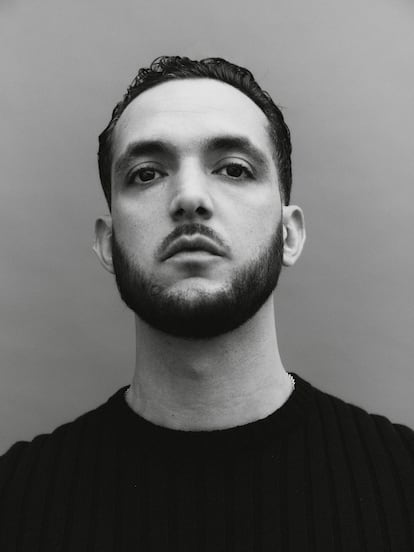
“He likes big productions, he comes up big and knows what he has to do,” affirms Bacana, when asked about director C. Tangana. Does Pucho want to be like you? “Yes,” Bacana responds. “And we’re like him,” González concludes. The future of Little Spain includes integrating the most relevant musical artists of Tangana’s generation, while developing fiction projects and giving a twist to the music videos’ esthetics.
“I should be rich now.” In the studio’s makeup room, Pucho continues to think about everything. He says that he washes his hair with very little water and keeps expenses down. “Management isn’t my thing. I have vision and intuition to take risks. I tell my mother and the others on my team that what I’m proposing may seem like suicide, but it’s not, it’s a crazy investment that’s worth it. So far, things have turned out well for me.”
“What I’ve done with El Madrileño is the most risky thing I’ve ever taken on in my life. When it was time for the tour and it was time to make money, I decided to turn the tour into an investment. Financially, it was a fiasco… but artistically, it’s the best thing I’ve ever done. I’m now in a position where I can work with whoever I want: the perception of me has changed, I feel proud. With a microphone, I could make people jump and scream and have a party. But that wasn’t art. My show is a strong artistic experience, like going to a play, a classical concert, or watching a movie. There’s something with cultural weight and influence — something that gets you excited,” he continues.
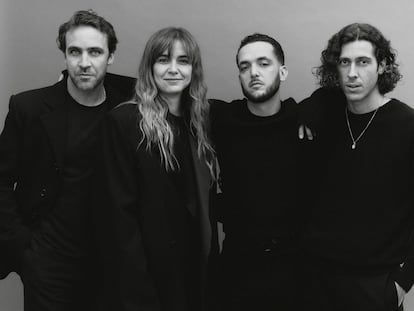
For someone who started this whole process without knowing how to sing, feeling insecure and somewhat misplaced, the final result seems satisfactory. And the way in which it has been managed — despite all the setbacks — has culminated in an artist who is still in pain, but who seems to have caught a glimpse of some inner peace. He won’t be moving to Miami: he’ll continue living at his house in Madrid, cooking fish and chatting for hours with his friends on the phone.
So, did the business dominate him? Or did he dominate the business? The answer will come in the next chapter of his career — whatever it’s called, whatever format it has.
Q. Given that you have star status, can you still be radical?
A. I think artists should do uncomfortable things. We shouldn’t go down the street bothering each other, but if someone is committed to creativity, they should bother you. Some say that the artist has to be an educator, an example, someone who must tell others how to behave. False. This was proposed before by the right and now by the left. And, of course, now those on the right believe they’re revolutionaries. They’re not. The artist shouldn’t be the guardian of any morality. I don’t believe in the artist who wants everyone to like him. That’s marketing.
Q. Should an artist take political sides?
A. Look, all I know is that when a journalist asks you about something political, it’s only to get you to repeat the statement that reaffirms their position, or the position of their outlet. That’s the way it is.
Q. Do interviews like these make sense to you? After all, if you want to say something, you already have your Instagram account.
A. The thing is that, deep down, I like to chat and see if [journalists] can take me to different places in the conversations. But it’s also true that the formats are now short and there’s no longer a pause [or time for] reflection.
Q. Does your future lie in Little Spain?
A. My future is absolutely linked to Little Spain. That’s a fact.
PRODUCTION CREDITS
Sign up for our weekly newsletter to get more English-language news coverage from EL PAÍS USA Edition
Tu suscripción se está usando en otro dispositivo
¿Quieres añadir otro usuario a tu suscripción?
Si continúas leyendo en este dispositivo, no se podrá leer en el otro.
FlechaTu suscripción se está usando en otro dispositivo y solo puedes acceder a EL PAÍS desde un dispositivo a la vez.
Si quieres compartir tu cuenta, cambia tu suscripción a la modalidad Premium, así podrás añadir otro usuario. Cada uno accederá con su propia cuenta de email, lo que os permitirá personalizar vuestra experiencia en EL PAÍS.
¿Tienes una suscripción de empresa? Accede aquí para contratar más cuentas.
En el caso de no saber quién está usando tu cuenta, te recomendamos cambiar tu contraseña aquí.
Si decides continuar compartiendo tu cuenta, este mensaje se mostrará en tu dispositivo y en el de la otra persona que está usando tu cuenta de forma indefinida, afectando a tu experiencia de lectura. Puedes consultar aquí los términos y condiciones de la suscripción digital.









































